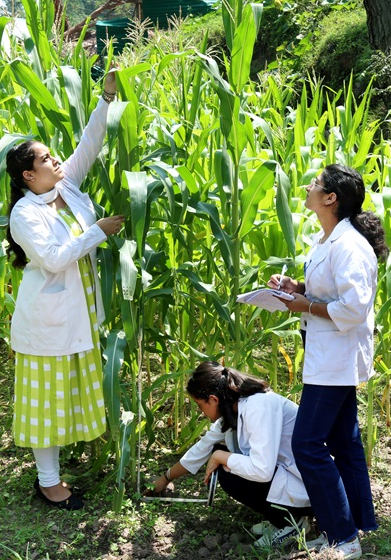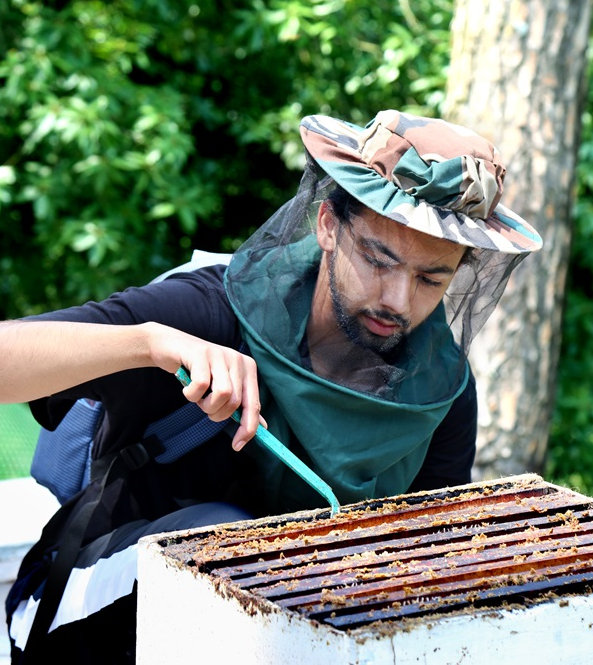MSc Soil Science & Agriculture Chemistry
Eligibility : BSc Agriculture/Horticulture/ Forestry with 6/10 OGPA or 60%.
- Duration : 2 years
- Admission Criteria : Shoolini University's multiple choice entrance test, and faculty interaction
MSc Soil Science & Agricultural Chemistry at Shoolini University is a two-year postgraduate program designed to deepen students' understanding of soil properties, fertility, and sustainable land management. The curriculum integrates theoretical knowledge with practical applications, focusing on soil-plant relationships, nutrient dynamics, and environmental quality.
Students engage in interdisciplinary learning, exploring advanced techniques for soil analysis and interpretation. The program emphasises the application of scientific approaches to address real-world challenges such as soil degradation, erosion, and nutrient management. Graduates contribute to sustainable agricultural practices and policy development.
Shoolini University's location in the Himalayan foothills offers a perfect setting to study diverse agro-climatic conditions. The faculty comprises experts from prestigious institutions, providing students with a blend of global perspectives and local insights. The program also encourages the incorporation of indigenous knowledge systems for environmentally friendly and resource-efficient soil management practices.
The program is guided by experienced faculty with academic backgrounds from leading institutions such as Oxford, NIH, NCI, Johns Hopkins Medical School, IISc, JNU, DU, and ZSI. Their diverse expertise brings a global outlook while staying rooted in local agricultural needs, keeping students aligned with current research and practical advancements.
Research Opportunities
Soil Fertility | Soil Pedology | Soil Physics | Soil Microbiology | Soil Chemistry | Soil Pollution

Global Links
Academic collaborations with universities in USA, UK, Korea, Taiwan, etc.

Real-Life Projects
Crop cafeteria and milk unit for field practicals. Kalaghat Farm for research and demonstration purposes.

Agri-Careers
Diverse, high-paying career paths in sectors like agribusiness, agricultural research, and sustainable practices.
VISION OF THE PROGRAM
To strengthen soil science research through interdisciplinary approaches and to encourage high-quality education in various soil science fields in order to maximise resource utilisation for improved agricultural practices for the betterment of the society.
MISSION OF THE PROGRAM
To give students a top-notch education that equips them with the knowledge and skills necessary to apply the basic concepts of soil science and natural resource management.
To use Indigenous knowledge to have insights into soil management practices that are environmentally friendly and resource efficient.
To enhance the understanding of soil science and how it relates to plant growth, nutrition, and environmental quality.
PROGRAM EDUCATIONAL OBJECTIVES
- PEO1: The students will be able to exhibit an in-depth understanding of soil science along with competence in applying advanced techniques for analysing and interpreting soil, applying scientific approaches to expand knowledge and enhance soil health.
- PEO2: A strong foundation of both verbal and written competence will enable students to effectively communicate challenging concepts in soil science to an array of audiences. They will also be able to thrive effectively in interdisciplinary teams, interacting with the public, legislators, and farmers to impart knowledge, address challenges related to soil, and encourage sustainable practices.
- PEO3: Students will use their expertise to address real-world problems such soil deterioration, erosion, and nutrient management. They will be crucial in enhancing long-term soil health and conservation via thoughtful decision-making and ethical concerns.
PROGRAM OUTCOME/ PROGRAM SPECIFIC OUTCOME
- PO1: Empowerment of the students to contribute towards improvements in crop productivity, using their knowledge of improved agronomic practices, seed science, diseases and insect/pest management, resource use, marketing, and resource conservation.
- PO2: Hands-on experience to apply modern tools and techniques for sustainable agriculture for improving farmers’ welfare.
- PO3: Capacity building for entrepreneurship and employability of the students in their chosen field of agriculture.
- PO4: Ability of the students to engage in critical thinking for furthering the goals of agricultural education and research.
- PSO1/PO5: Strengthening of the student skill set in the chosen fields of specialization for optimal resource use in agriculture.
- PSO2/PO6: Development of industry-ready technical human resource.
- PSO3/PO7: Sharpened ability to suggest scientific solutions for various production and protection problems in different crops.
MSc Soil Science & Agriculture Chemistry Career Opportunities
- Soil Chemist
- Jobs in Fertilizer Companies
- Pollution Control Boards
- Assistant Professor in Soil Science in State Agriculture and at Central Agriculture Universities
- Subject Matter Specialist at Krishi Vigyan Kendra (Soil Science)
- Jobs in Regional Rural Banks and Public Sector Banks
|
|
|
|
Program Details
Top Faculty
Student Voices
Frequently Asked Questions
Who teaches MSc Agriculture (Soil Science) at Shoolini University?
The program is taught by top faculty members with academic backgrounds from renowned institutions like Oxford, IISc, NIH (USA), and the National Cancer Institute (USA). These experts bring deep knowledge and research experience in soil science, helping students learn both theory and practical applications.
What are the future opportunities after completing MSc in Agriculture (Soil Science) from Shoolini University?
Graduates can work as Soil Scientists, Fertility Management Experts, Environmental Consultants, Research Officers, or in agricultural input companies, government agencies, and NGOs. Many students qualify for Junior Research Fellowships (JRF) and pursue careers in research and higher education. With a growing demand for soil and environmental experts, students can expect lucrative job offers in India and abroad.
What are the placement opportunities available for students who have completed MSc in Agriculture (Soil Science) at Shoolini University?
Graduates enjoy excellent placement support through Shoolini’s active Placement Cell, which offers training, internships, and job assistance. The university’s ‘Mission 130’ initiative ensures focused efforts for 100% placements, helping students secure jobs in leading organisations.
How do you expose students to industry and field experience?
Shoolini provides hands-on field training through its Crop Cafeteria, Kalaghat Farm, and small-scale milk unit. Students are involved in real-time soil testing, land use planning, and nutrient management projects. Academic collaborations with universities in the USA, UK, Korea, and Taiwan allow students to gain international insights and exposure. They also interact with industry professionals through seminars and workshops.
Is practical training a part of MSc Agriculture (Soil Science)?
Yes, practical learning is a core part of the course. Students learn on university-owned farmlands and use advanced lab and field tools to study soil chemistry, fertility, and conservation. All facilities follow ICAR guidelines, ensuring high-quality education.
Latest Blogs
Explore the latest insights and updates in our newest Shoolini University blogs!
Still have Queries? Contact Us
Please fill in the form and an expert from the admissions office will call you in the next 4 working hours.




.jpg)






















